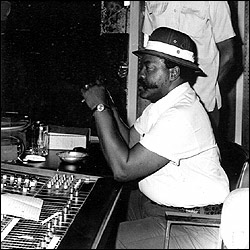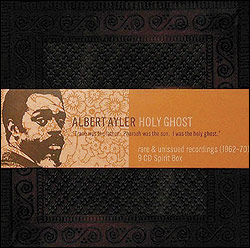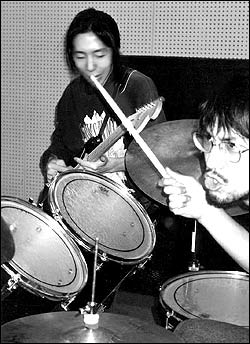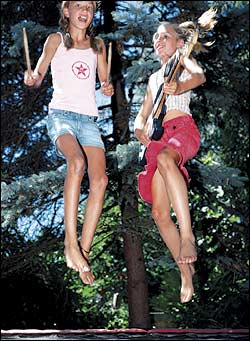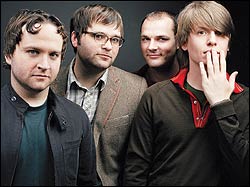Every great record’s got a story behind it, but sometimes not-so-great records have even better stories. The Numero Group label has so far released two volumes of its Eccentric Soul series—”eccentric” here doesn’t refer to the music so much as the circumstances of its creation. The first volume collects most of the discography of Capsoul, an otherwise forgotten independent soul label from Columbus, Ohio, run by a DJ named Bill Moss. Capsoul had some regional success but never quite scored a national hit, and listening to The Capsoul Label you can tell why. They had a couple of very good singers (especially Marion Black, a sorrowful belter in the vein of Otis Redding, and Virgil Johnson of Johnson, Hawkins, Tatum & Durr), and some solid songwriters, and a production style in line with the soul hits of their day (from 1970 to 1974). And they were willing to do whatever it took to get a hit—maybe too willing. On hearing that Al Green’s girlfriend had poured scalding-hot grits on him and then killed herself, Moss zoomed to the studio and converted an old instrumental into a chant called “Hot Grits!!!”
Capsoul’s records are consistently almost what they want to be. The singers come very close to nailing the high notes; the harmonies are just barely short of locking in like the Temptations or Four Tops; the band is in the groove, pretty much, but slips out every so often. If you were a soul buff in Columbus in those days, you could take pride in living in the same city as the Capsoul roster. A radio station that played the Four Mints’ “Row My Boat” or Marion Black’s “Go On Fool” wouldn’t sound entirely like a New York or L.A. station, which is itself something to be proud of. Capsoul’s records aren’t exactly lost classics; you can say they’re dated and generic, or to be more accurate, you can say they’re of their time and of their genre, which means they’re still a lot of fun.
The second Eccentric Soul disc, The Bandit Label, on the other hand, is more interesting for its history than for its actual music. Through the 1970s, Arrow Brown was the shady presence behind the Chicago label Bandit, as well as its groups the Arrows and (cough) the Majestic Arrows, the father of the painfully off-key Michael Jackson wanna-be Altyrone Deno Brown—a handwritten note on his first record label read “(7 YEARS OLD)”—and the ruler of the label’s headquarters, which the liner notes describe as being “in a foggy area between harem and commune.” Brown wasn’t so hot as a songwriter, but he was a serious go-getter, and exceptionally charismatic—he talked session musicians into doing clandestine, nonunion recordings, and a few of the Majestic Arrows’ songs are decent, satiny ballads in the mold of the Chi-Lites. The Bandit Label is a dramatic illustration of exactly how far willpower and charm can take an artist before talent and inspiration have to take over the load.
Speaking of charm, and of a totally different order of proficiency issues, a second album by the Thai Elephant Orchestra, Elephonic Rhapsodies (Mulatta), has just appeared. The T.E.O. are billed as “the world’s largest standing orchestra,” which is true in terms of mass: The 12 elephants in the group weigh 23 metric tons, and they’ve been trained to play various percussion instruments, panpipes, and harmonicas with their trunks. As you might imagine, they tend to favor lumbering free-form pieces over more complex compositions, and one of the album’s highlights is “The Ganesha Symphony,” four short elephonic improvisations selected and edited by composer Dave Soldier and elephant expert Richard Lair.
Roughly half the album is collaborations between elephants and human musicians. There’s an elephant-augmented cover of Hank Williams’ “Kaw-Liga,” which as it happens is the theme song of the forestry department that governs the Elephant Conservation Center, as well as a version of the first movement of Beethoven’s Sixth Symphony by a mixed group of amateur human brass players and professional elephant percussionists—this is how they make their living.
Soldier releases a lot of semi-goofy music on Mulatta Records—other new albums from the label include his own Soldier String Quartet’s Inspect for Damaged Gods, which includes string-quartet arrangements of “Bo Diddley” and Sly Stone’s “In Time,” and Twink’s Supercute (made mostly from toy instruments on their most abrasive settings). A lot of Elephonic Rhapsodies isn’t terribly serious, either—”A Child’s Guide to the Elephant Orchestra” is an introduction to the beasts and their instruments that riffs on the Bonzo Dog Band’s “The Intro and the Outro.” (“And now, our oldest and largest player, the incredible Mae Kot!”)
You can also take pleasure in the elephants’ music for its pure sound. The way they play their xylophones and gongs isn’t the way humans would play, but it’s got its own sort of internal logic. A few of the people who play along with the T.E.O. treat elephant music as intriguing interference—a more complicated version of wind chimes. But the best try to play with them—or, as Soldier puts it, “you must adapt to the elephants, not they to you.”
